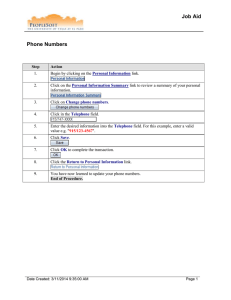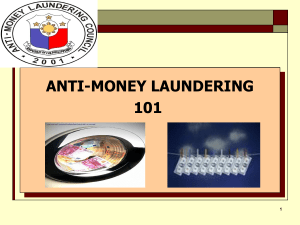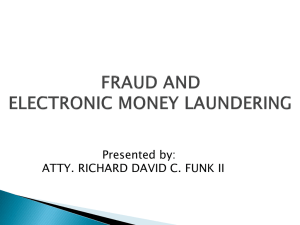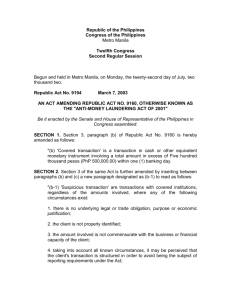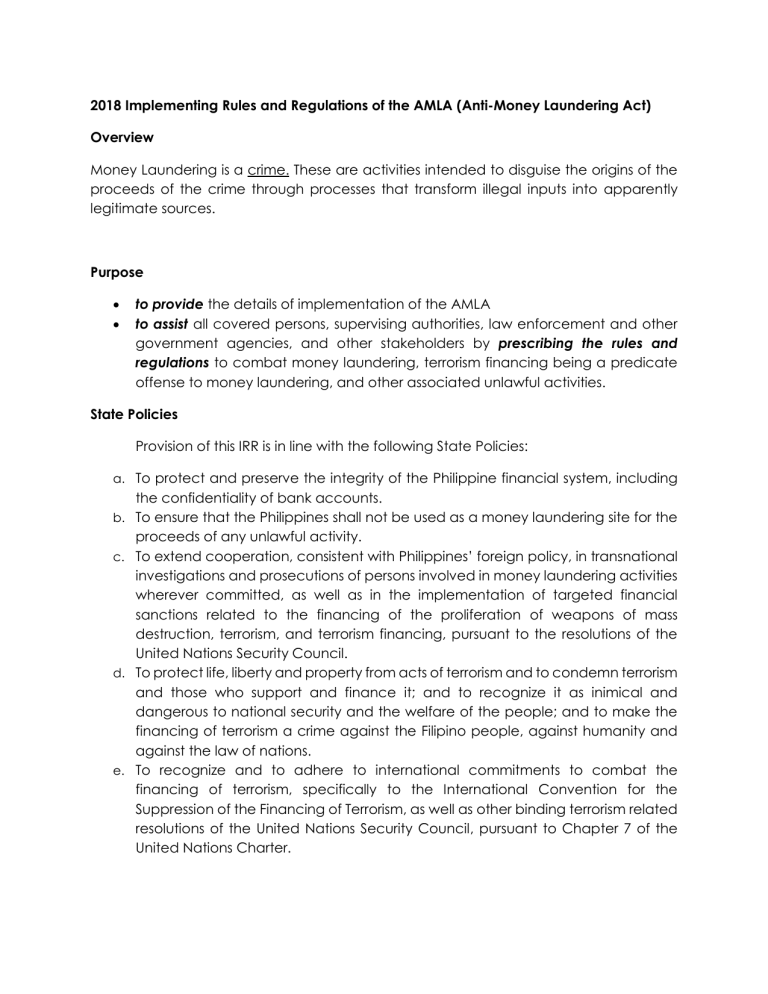
2018 Implementing Rules and Regulations of the AMLA (Anti-Money Laundering Act) Overview Money Laundering is a crime. These are activities intended to disguise the origins of the proceeds of the crime through processes that transform illegal inputs into apparently legitimate sources. Purpose to provide the details of implementation of the AMLA to assist all covered persons, supervising authorities, law enforcement and other government agencies, and other stakeholders by prescribing the rules and regulations to combat money laundering, terrorism financing being a predicate offense to money laundering, and other associated unlawful activities. State Policies Provision of this IRR is in line with the following State Policies: a. To protect and preserve the integrity of the Philippine financial system, including b. c. d. e. the confidentiality of bank accounts. To ensure that the Philippines shall not be used as a money laundering site for the proceeds of any unlawful activity. To extend cooperation, consistent with Philippines’ foreign policy, in transnational investigations and prosecutions of persons involved in money laundering activities wherever committed, as well as in the implementation of targeted financial sanctions related to the financing of the proliferation of weapons of mass destruction, terrorism, and terrorism financing, pursuant to the resolutions of the United Nations Security Council. To protect life, liberty and property from acts of terrorism and to condemn terrorism and those who support and finance it; and to recognize it as inimical and dangerous to national security and the welfare of the people; and to make the financing of terrorism a crime against the Filipino people, against humanity and against the law of nations. To recognize and to adhere to international commitments to combat the financing of terrorism, specifically to the International Convention for the Suppression of the Financing of Terrorism, as well as other binding terrorism related resolutions of the United Nations Security Council, pursuant to Chapter 7 of the United Nations Charter. f. To reinforce the fight against terrorism by preventing and suppressing the commission of said offenses through freezing and forfeiture of property or funds while protecting human rights. Governing Principle The anti-money laundering/counter-terrorism financing (AML/CTF) regime of the Philippines shall be governed by the following principles: a. The AMLC, as the country’s financial intelligence unit, is vested by law with b. c. d. e. f. g. independence to perform its mandate. It upholds the continuous development of a team of highly ethical and professional personnel and implements efficient processes in the delivery of its mandate. The AML/CTF laws, rules and regulations and other relevant issuances are implemented using a risk-based approach in a way that responds to the need to bring the financially excluded into the regulated financial sector, while at the same time maintaining effective safeguards and effective controls against money laundering/terrorism financing risks. A strong compliance culture, good governance and observance of high ethical standards in the conduct of business are good foundations for an effective AML/CTF regime. It will be developed and sustained through capacity building and deterrence of violations through imposition of appropriate, proportionate and dissuasive sanctions. A sound risk management system to identify, assess, mitigate, monitor, and control risks associated with money laundering/terrorism financing is essential. Timely and effective domestic and international cooperation and established coordination mechanism are critical in the investigation and prosecution of money laundering/terrorism financing and associated unlawful activities. The implementation of AML laws, rules and regulations shall conform to international AML/CTF standards and best practices. The observance of the constitutional requirements on due process, and injunction against ex post facto laws and bills of attainder. Definition of terms AMLC (Anti-Money Laundering Council) – the government instrumentality mandated to implement the AMLA and TFPSA (Terrorism Financing Prevention and Suppression Act). It shall be composed of: a) The Governor of Bangko Sentral ng Pilipinas(BSP) as Chairman; b) The Commissioner of the Insurance Commission as member; and c) The Chairman of the Securities and Exchange Commission (SEC) as member Bank Inquiry - refers to provisional remedy that allows the AMLC to examine or inquire into particular bank accounts or investments with a banks or non-bank financial institution, notwithstanding the provisions of banks secrecy laws. Freeze Order – refers to provisional remedy aimed at blocking or restraining monetary instruments or properties in any way related to an unlawful activity from being transacted, converted, concealed, moved, or disposed without affecting the ownership thereof. Covered Person The following are the covered persons under the AMLA: A. Financial Institutions 1. Persons supervised and/or regulated by BSP (Banks, Quasi-banks, Trust entities, Pawnshops. Non-stock savings and loan associations, Other non-bank financial institutions which under special laws, Electronic money issuers, Foreign exchange dealers, money changers, and remittance and transfer companies) 2. Persons supervised or regulated by IC (Insurance companies, Pre-need companies, Insurance agents, Insurance brokers, Professional reinsurers, Reinsurance brokers, Holding companies, Holding company systems, Mutual benefit associations, All other persons and their subsidiaries and affiliates supervised or regulated by the IC) 3. Persons supervised or regulated by SEC a. Securities dealers, brokers, salesmen, investment houses, and other similar persons managing securities or rendering services, such as investment agents, advisors, or consultants; b. Mutual funds or open-end investment companies, close-end investment companies or issuers, and other similar entities; and c. Other entities, administering or otherwise dealing in commodities, or financial derivatives based thereon, valuable objects, cash substitutes, and other similar monetary instruments or properties B. DNFBPs 1. Jewelry dealers 2. Dealers in precious metals, and dealers in precious stones 3. Company service providers, which, as a business, provide any f the following services to third parties: a. Asting as a formation agent of juridical persons 4. 5. 6. 7. b. Acting as (or arranging for another person to act as) a director or corporate secretary of a company, a partner of a partnership, or a similar position in relation to other juridical persons c. Providing a registered office; business address or accommodation, correspondence or administrative address for a company, a partnership or any other juridical person or legal arrangement d. Acting as (or arranging for another person to act as) a nominee shareholder for another person. Persons, including lawyers, accountants and other professionals, who provide any of the following services: a. Managing of client money, securities or other assets b. Management of bank, savings, securities or other assets c. Organization of contributions for the creation, operation or management of companies d. Creation, operation or management of juridical persons or arrangements, and buying and selling business entities. Casinos, including internet-based casinos and ship-based casinos, with respect to their casino cash transactions related to their gaming operations. Real Estate Brokers and Developers. Offshore Gaming Operators, as well as their service providers, supervised, accredited or regulated by the Philippine Amusement and Gaming Corporation (PAGCOR) or any appropriate government agency ** Reportorial Requirement: Covered persons should report to AMLC all covered and suspicious transactions within five (5) working days from the occurrence thereof. Covered Transaction - refers to: a) A transaction in cash or other equivalent monetary instrument exceeding Five Hundred Thousand pesos (PHP500,000.00). b) A transaction with or involving jewelry dealers, dealers in precious metals and dealers in precious stones in cash or other equivalent monetary instrument exceeding One Million pesos (Php1,000,000.00). c) A casino cash transaction exceeding Five Million Pesos (PHP5,000,000.00) or its equivalent in other currency. d) A cash transaction with or involving real estate developers or brokers exceeding Seven Million Five Hundred Thousand Pesos (P7,500,000.00) or its equivalent in any other currency. Suspicious Transaction - Refers to a transaction, regardless of the amount involved, where any of the following circumstances exists: 1. No underlying legal or trade obligation, purpose, or economic justification. 2. Client is not properly identified. 3. Amount involved not commensurate with client’s business or financial capacity. 4. Transactions structured in order to avoid being subject of reportorial requirements 5. Transaction which deviates from client’s profile and/or client’s past transactions with covered institutions 6. Transaction related to an unlawful activity, including those committed or about to be committed 7. Similar or analogous transaction. Unlawful activities – refers to any act or omission, or series or combination thereof, involving or having direct relation, to the following: a.) “Kidnapping for Ransom” under Article 267 of Act No. 3815, otherwise known as the Revised Penal Code, as amended; b.) Sections 4, 5, 6, 8, 9, 10, 11, 12,13, 14, 15 and 16 of Republic Act No. 9165, otherwise known as the “Comprehensive Dangerous Drugs Act of 2002”; c.) Section 3 paragraphs b, c, e, g, h and i of Republic Act No. 3019, as amended, otherwise known as the “Anti-Graft and Corrupt Practices Act”; d.) “Plunder” under Republic Act No. 7080, as amended; e.) “Robbery” and “Extortion” under Articles 294, 295, 296, 299, 300, 301 and 302 of the Revised Penal Code, as amended; f.) “Jueteng” and “Masiao” punished as illegal gambling under Presidential Decree No. 1602; g.) “Piracy on the High Seas” under the Revised Penal Code, as amended, and Presidential Decree No. 532: h.) “Qualified Theft” under Article 310 of the Revised Penal Code, as amended; i.) “Swindling” under Article 315 and “Other Forms of Swindling” under Article 316 of the Revised Penal Code, as amended: j.) “Smuggling” under Republic Act No. 455, and Republic Act No. 1937, as amended, otherwise known as the “Tariff and Customs Code of the Philippines”; k.) Violations under Republic Act No. 8792, otherwise known as the “Electronic Commerce Act of 2000”; l.) “Hijacking” and other violations under Republic Act No. 6235, otherwise known as the “AntiHijacking Law”; “Destructive Arson”; and “Murder”, as defined under the Revised Penal Code, as amended; m.) “Terrorism” and “Conspiracy to Commit Terrorism”, as defined and penalized under Sections 3 and 4 of Republic Act No. 9372; n.) “Financing of Terrorism” under Section 4 and offenses punishable under Sections 5, 6, 7 and 8 of Republic Act No. 10168, otherwise known as the “Terrorism Financing Prevention and Suppression Act of 2012”; o.) “Bribery” under Articles 210, 211 and 211-A of the Revised Penal Code, as amended, and “Corruption of Public Officers” under Article 212 of the Revised Penal Code, as amended; p.) “Frauds and Illegal Exactions and Transactions” under Articles 213, 214, 215 and 216 of the Revised Penal Code, as amended; q.) “Malversation of Public Funds and Property” under Articles 217 and 222 of the Revised Penal Code, as amended; r.) “Forgeries” and “Counterfeiting” under Articles 163, 166, 167, 168, 169 and 176 of the Revised Penal Code, as amended; s.) Violations of Sections 4 to 6 of Republic Act No. 9208, otherwise known as the “AntiTrafficking in Persons Act of 2003, as amended”; t.) Violations of Sections 78 to 79 of Chapter IV of Presidential Decree No. 705, otherwise known as the “Revised Forestry Code of the Philippines, as amended”; u.) Violations of Sections 86 to 106 of Chapter IV of Republic Act No. 8550, otherwise known as the “Philippine Fisheries Code of 1998”; v.) Violations of Sections 101 to 107, and 110 of Republic Act No. 7942, otherwise known as the “Philippine Mining Act of 1995”; w.) Violations of Section 27(c), (e), (f), (g) and (i) of Republic Act No. 9147, otherwise known as the “Wildlife Resources Conservation and Protection Act”; x.) Violations of Section 7(b) of Republic Act No. 9072, otherwise known as the “National Caves and Cave Resources Management Protection Act”; y.) Violation of Republic Act No. 6539, otherwise known as the “Anti-Carnapping Act of 2002, as amended”; z.) Violation of Sections 1, 3, and 5 of Presidential Decree No. 1866, as amended, otherwise known as the decree “Codifying the Laws on Illegal/Unlawful Possession, Manufacture, Dealing In, Acquisition or Disposition of Firearms, Ammunition or Explosives”; aa.) Violation of Presidential Decree No. 1612, otherwise known as the “AntiFencing Law”; bb.) Violation of Section 6 of Republic Act No. 8042, otherwise known as the “Migrant Workers and Overseas Filipinos Act of 1995, as amended”; cc.) Violation of Republic Act No. 8293, otherwise known as the “Intellectual Property Code of the Philippines, as amended”; dd.) Violation of Section 4 of Republic Act No. 9995, otherwise known as the “Anti-Photo and Video Voyeurism Act of 2009”; ee.) Violation of Section 4 of Republic Act No. 9775, otherwise known as the “Anti-Child Pornography Act of 2009”; ff.) Violations of Sections 5, 7, 8, 9, 10 (c), (d) and (e), 11, 12 and 14 of Republic Act No. 7610, otherwise known as the “Special Protection of Children Against Abuse, Exploitation and Discrimination”; gg.) Fraudulent practices and other violations under Republic Act No. 8799, otherwise known as the “Securities Regulation Code of 2000”; hh.) Violation of Section 19 (A)(3) of Republic Act No. 10697, otherwise known as “The Strategic Trade Management Act”, in relation to Proliferation of WMD and PF pursuant to UNSC Resolution Nos. 1718 of 2006 and 2231 of 2015;20 ii.) Violations of Section 254 of Chapter II, Title X of the “National Internal Revenue Code of 1997”, as amended, where the deficiency basic tax due in the final assessment is in excess of Twenty-Five Million Pesos (P25,000,000.00) per taxable year, for each tax type covered and there has been a finding of probable cause by the competent authority: Provided, further, that there must be a finding of fraud, willful misrepresentation or malicious intent on the part of the taxpayer: Provided, finally, that in no case shall the AMLC institute forfeiture proceedings to recover monetary instruments, property or proceeds representing, involving, or relating to a tax crime, if the same has already been recovered or collected by the Bureau of Internal Revenue (BIR) in a separate proceeding;21 jj.) Felonies and offenses of a similar nature that are punishable under the penal laws of other countries Money laundering Money laundering is committed by: a.) Any person who, knowing that any monetary instrument or property represents, involves, or relates to the proceeds of any unlawful activity: 1. transacts said monetary instrument or property; 2. converts, transfers, disposes of, moves, acquires, possesses or uses said monetary instrument or property; 3. conceals or disguises the true nature, source, location, disposition, movement or ownership of or rights with respect to said monetary instrument or property; 4. attempts or conspires to commit ML offenses referred to in (1), (2), or (3) above; 5. aids, abets, assists in, or counsels the commission of the ML offenses referred to in (1), (2), or (3) above; and 6. performs or fails to perform any act as a result of which he facilitates the offense of ML referred to in items (1), (2), or (3) above. b.) Any covered person who, knowing that a covered or suspicious transaction is required under the AMLA to be reported to the AMLC, fails to do. Stages of Money Laundering 1. Placement – The launderer inserts dirty money into a legitimate financial institution 2. Layering – Involves sending money through various financial transactions to change its form and make it more difficult to follow. 3. Integration - At this stage the money re-enters mainstream economy in legitimatelooking form, appearing to have come from legitimate transaction. Terrorism Financing - Terrorism financing is a crime wherein a person, directly or indirectly, willfully and without lawful excuse, possesses, provides, collects or uses property or funds or make available property, funds, or financial services or other related services, by any means, with unlawful and willful intension that they should be used or with the knowledge that they are to be used, in full or in part - (a) To carry out or facilitate the commission of any terrorism act; - (b) By a terrorist organization, association, or group; - (c) Or by an individual terrorist. Any person who organize or directs other to commit financing of terrorism shall likewise be guilty. And shall suffer the penalty of reclusion temporal in its maximum period to Reclusion Perpetua and a fine of not less than Five hundred thousand pesos (Php500,000.00) nor more than One million pesos (Php1,000,000.00). And, it shall not be necessary that funds were actually used for an act to be constituted as a terrorism financing. Asset Forfeiture 1. Civil Forfeiture – Upon determination that probable cause exists that any monetary instrument or property is in any way related to an unlawful activity or a money laundering offense, the AMLC shall file with the regional trial court, through the Office of the Solicitor General, a verified petition for civil forfeiture. 2. No Prior Criminal Charge, Pendency of or Conviction – No prior criminal charge, pendency of or conviction for an unlawful activity or money laundering offense is necessary for the commencement or the resolution of a petition for civil forfeiture. 3. Asset Forfeiture in Money Laundering Cases – Where there is conviction for money laundering, the court shall issue a judgment of forfeiture in favour of the Government of the Philippines with respect to the monetary instrument or property found to be proceeds of an unlawful activity. Preventive Measures and Obligations of Covered Persons 1. Customer Identification – Covered institutions shall establish and record the true identity of its clients based on official documents. a. Face-to-Face Contact – covered persons shall conduct face-to-face contact at the commencement of the relationship, or as reasonably practicable so as not to interrupt the normal conduct of business. b. Minimum Customer Information and Identification Documents - Name of customer; - Date of Place of birth; - Name of beneficial owner, if applicable; - Name of beneficiary (in case of insurance contracts or remittance transactions); - Present address; - Contact number or information; - Nationality - Specimen signatures or biometrics of the customer; - Nature of work and name of employer or nature of self-employment business, if applicable; - Sources of funds or property; and - Tax Identification Number (TIN), Social Security System (SSS) number, or Government Service Insurance System (GSIS) number, if applicable. c. Prohibited Accounts a. Anonymous Accounts and Accounts under Fictitious Names. – Covered persons shall maintain customers’ account only in the true and full name of the account owner or holder. Anonymous accounts, accounts under fictitious names, and all other accounts shall be absolutely prohibited. b. Number Accounts. – Number accounts, except non-checking numbered accounts, shall not be allowed. Covered and suspicious transaction reports involving non-checking numbered accounts shall contain the true name of the account holder. Beneficial Ownership The Guideline on Beneficial Ownership, require banks, other financial institutions, and certain professions to identify not only the customer with whom they transact, but also the beneficial owners. “Beneficial Owner” refers to any natural person who: 1) Ultimately owns or controls the customer and/or on whose behalf a transaction or activity is being conducted; 2) Has ultimate effective control over a juridical person or legal arrangement; or 3) Owns, at least, twenty percent (20%) shares, contributions or equity interest in a juridical person or legal arrangement. Control includes whether the control is exerted by means of trusts, agreements, arrangements, understandings, or practices, and whether or not the individual can exercise control through making decisions about financial and operating policies. 2. Record Keeping a. All records of all transactions of covered institutions shall be maintained and safely stored for five (5) years from the dates of transactions. Said records and files shall contain the full and true identity of the owners or holders of the accounts involved in the covered transactions and all other customer identification documents. b. If closed accounts – at least fives (5) years from the date when they were closed. c. If a money laundering case was filed – file must be retained until it is confirmed that the case has been finally resolved or terminated by the court. 3. Reportorial Requirement Covered persons must report to the AMLC all covered and suspicious transactions within five(5) working days from occurrence thereof. Covered transactions – these are transactions in cash or other equievalents monetary instruments involving a total amount in excess of P500,000 within one banking day. 1. transactions with or involving jewelry dealers, dealers in precious metals and precious stones in cash or other equivalent monetary instrument exceeding P1,000,000 2. Casino cash transaction exceeding P5,000,000 or its equivalent in other currency 3. Cash transaction with or involving real estate developers or brokers exceeding P7,500,000 or its equivalent in any other currency. Suspicious transaction Refers to a transaction, regardless of the amount involved, where any of the following circumstances exists: 8. No underlying legal or trade obligation, purpose, or economic justification. 9. Client is not properly identified. 10. Amount involved not commensurate with client’s business or financial capacity. 11. Transactions structured in order to avoid being subject of reportorial requirements 12. Transaction which deviates from client’s profile and/or client’s past transactions with covered institutions 13. Transaction related to an unlawful activity, including those committed or about to be committed 14. Similar or analogous transaction. 4. Safe Harbor Provision No administrative, criminal or civil proceedings, shall lie against any person for having made a covered or suspicious transaction report in the regular performance of his duties in good faith, whether or not such reporting results in any criminal prosecution under this Act or any other law.
